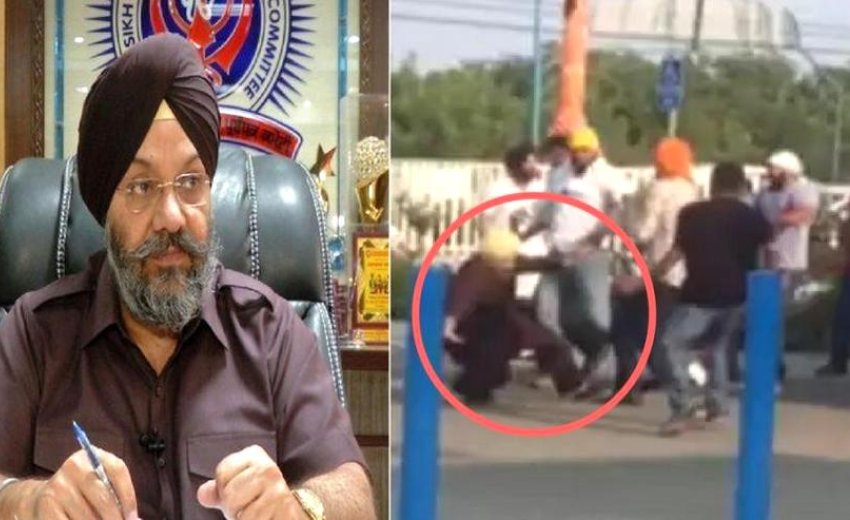News inundating us these days tells us that the President of the Delhi Sikh Gurduara Management Committee (DSGMC), Manjit G.K. Singh was attacked by pro-Khalistani Sikhs in California.
Clearly such matters are disturbing and we need to look at them with a cynical but analytic and peaceful eye.
I know that Indian Government agents were not welcome in most Sikh gatherings in America. But physical altercations were few, if any. Why the new surge in such incidents – real or staged – 34 years after the events of 1984? Why such excitement in India, when Manjit G.K’s incidents occurred 10,000 miles away in California?
Why my cynical reaction to the news?
My first reaction to the imbroglio is that the report begins and ends by connecting the MGSK event to the brazen killings of Sikhs by the Indian army and to the government inspired killings and crimes – always labeled anti-Sikh riots, in 1984. One could write a book about that time, and many such books have been written. I take a pass on those events today except to emphatically and clearly state that the word “riot” implies violence from both sides and aimed at both sides. Furthermore, in a riot there is a spontaneity to the killings and lootings without organized planning. Also “riot” excludes (denies) the collusion of the police or government. And yes, the ten Investigation Committees failed miserably to complete an honest inquiry; hence they speak of “riots” but NEVER of a planned massacre.
My one paragraph above requests that we proceed with some basic honesty here. Please look up a reasonable dictionary definition of “riot”.
1984 was attempted genocide. Don’t deny it. Work to correct those who do. Such dishonesty doesn’t become us and misleads the record.
I am no fan of our current American President, Donald Trump, but here I bow my head to his tactics (not in appreciation but in frustration); he is a crook but he is shrewd, and the Indian political apparatus seems to have a learned a lesson or two in how to create fake news, and how to twist and dominate the fake news cycle. Dumb he is not, but remains superbly manipulative.
The violence against Manjit G.K. Singh occurred in California, in the USA, a country where I have lived for almost 60 years. As I said, the Indian operatives seem to have learned a lot from Donald Trump.
Item one is that an American is expected to remain aware of the goings on in the world. If I am allowed to, and expected to be able to talk about Vietnam, Cuba, China, or North Korea, apartheid in South Africa of some years ago, or what have you, then why should I hold my tongue when it comes to India? Because I came from there? That is utter nonsense.
Before 1984, any honest poll of Sikhs in India or anywhere would have been able to count ‘Sikhs for Khalistan’ on the fingers of one hand with room to spare. After 1984, any poll of Sikhs on Khalistan anywhere in the world would have counted those who were NOT for Khalistan on the fingers of one hand with room to spare.
Why such a dramatic shift? The tone-deaf policies of the Indian political leadership.
The easiest way to deal with Khalistan supporters outside India would be to ignore their small minority. Remember that expatriate Sikhs have the right to their opinions, but they are small minority. India needs to deal with and work with Sikhs who are Indian citizens and live in India.
Undoubtedly, things have changed. And that is welcome. But bitterness still persists because the Indian political bureaucracy and its cultural myopia persist.
The Sikh connection to Pakistan is another matter. India, more than anyone else needs to realize that the Sikhs, a very small minority — barely two percent of a billion plus nation of India — are a dynamic community. During India’s struggle for independence, around two-thirds of all who were sentenced to death or life-imprisonment were Sikhs. Sikhs are not anxious for Khalistan unless the Indian government treats them shabbily -- as a minority that is easily discarded. That is not what a sensible government should do.
Dating from India’s division in 1947, matters have largely deteriorated between the two nations that resulted from the partition of Subcontinent. The issues between India and Pakistan are politically long-standing dating from 1947. Punjabis and Sikhs were the losers – they suffered the most in lives and property during independence and partition. Yet, in its many wars with Pakistan, the Punjabi and Sikh soldiers came to India’s rescue.
To think of Sikhs as disloyal to the unity of India shows ignorance of Indian history, and is stupid beyond imagination.
Looking at the current imbroglio re: Manjit G.K. Singh, I see two possibilities, neither one very welcoming.
First: Yes, there is a handful of Sikhs who remain angry and suspicious of the India government because of the events of 1984 and India’s ham-handed approach to resolve events that good sense would have easily managed long ago. My advice is that it is not too late. Good sense should not be so rare in India; using it will not diminish its supply.
Second: The shenanigans re: Manjit Singh, the DSGMC leader, might reveal a broader conspiracy against the Sikhs that, in the long run, will do no good to India, Pakistan or Sikhs in general. At a personal level, we need a cultural cleanup of backstage manipulations, of secretive cabals and governmental dals with a handful of selected Sikhs who remain close to government leaders. This is not grand strategy or a road anywhere progressive. It is dumb for governments as well as for their people. It is true that Sikhs and Punjabis suffered the most economic loss along with loss of lives in 1947. But it is never a good or grand policy to stoke religions and religious issues to further drive a wedge between neighbors.
My questions: Are the attacks on Manjit G.K. Singh really based on issues of 1984, or some other matters? Is the attack actually by Khalistanis or is it faked for India’s secret services and domestic political perceptions? Keep in mind that the Indian political parties are trying to run away from the responsibilities of the injustice and silence speaking on killings of Sikhs in, and since, 1984. (Here the question is not whether Rahul Gandhi is personally responsible, but what his political party is and what is its new leadership doing about it.)
Are these attacks on Manjit G. K. Singh staged to divide the diaspora Sikhs and their thinking on Indian politics etc.? Look at the rumors that connect such incidents to Jagdish Tytler, a notorious figure from the 1984 Sikh killings. Don’t be shocked at such possibilities. Indian political parties have a flagrant record of such shenanigans against Sikhs, Muslims, and untouchable Hindus – perhaps other people as well. An honest enquiry will do more good for both us Sikhs and India – but don’t hold your breath for it.
If such reports are meant to rile us up, well don’t do it! The Indian government should know that Sikhs are not the enemy – history teaches that lesson.
Better to remember the adage: Keep your friends close and your enemies closer.





